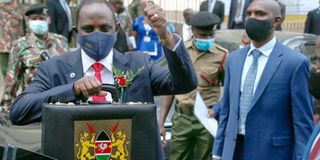Premium
Token Sh23bn stimulus: Slow recovery, depressed taxes, more debts

Treasury Cabinet Secretary Ukur Yatani pose for a photo with the budget briefcase at The Treasury before leaving for Parliament Buildings for the reading of 2021/2022 annual budget on June 10, 2021.
What you need to know:
- Economists had been unsuccessfully urging the Treasury to offer a big stimulus.
- Most businesses have difficulties accessing working capital because their bank balances have been erratic for the past 16 months.
Although some pomp and ceremony remain, the budget-making secrecy of yesteryears is long gone. The details of all budgetary allocations have been available on the National Treasury website for weeks ahead of the reading of the budget statement last Thursday.
The other key allocation is to counties, and is driven by the Division of Revenue Act, which was concluded a couple of months back, and among the counties themselves, by the County Allocation Act.
Despite all this openness, however, the many documents make it hard to tell the totality of resources going to the national government, Parliament, Judiciary, constitutional commissions and counties.
Conspicuously missing in the budget are serious efforts to stimulate economic activity.
Now financing the big-ticket items is important. However, without vibrant economic activity, big infrastructure cannot unlock full potential because economic activity will remain depressed and tax collections will continue to be sluggish.
Economists had been unsuccessfully urging the Treasury to offer a big stimulus. Most businesses have difficulties accessing working capital because their bank balances have been erratic for the past 16 months. Besides, at 12.5 per cent interest, many would be unable to repay bank loans.
Sh900 billion deficit
How much did the Treasury Cabinet Secretary allocate to stimulus efforts? A token 23.1 billion. Or at least that is what the one-pager on key allocations says. And you will be hard pressed to find it in the detail!
The CS does, however, say he will invest 310.7 billion on infrastructure to unlock growth! He has maintained his focus on large projects, leaving economic recovery to chance. Poor recovery will mean slow or no growth in tax collections. This in turn will force him to borrow heavily to cover the Sh900 billion deficit. More borrowing crowds out the private sector and the cycle continues!
Another worrisome issue is the fact that the Economic Survey 2021 has not been released. So we cannot tell the macro data that the CS is relying on while framing his estimates.
For the counties, especially, a budget on paper that is not backed by disbursements counts for nothing. At the time of reading his budget, the CS was Sh102 billion behind schedule of disbursement of equitable share to counties. Most counties (27) have not received a penny for four months – March, April, May and now June.
This means they cannot pay pending bills, making a mockery of his own directive that everyone must pay their pending bills by June 30. The knock-on effect is that workers, suppliers and contractors cannot pay their own bills. This leads to poor tax revenue performance, and again the cycle continues.
A bright spot in the budget is the Sh47.7 billion allocated to universal health. Ensuring poor households have health insurance is critical for a sustainable health sector. The normal quarrels of the allocations going to the Ministry of Health headquarters instead of primary health institutions notwithstanding, it is an excellent step towards attaining universal health care.
The writer is the Governor of Laikipia County





